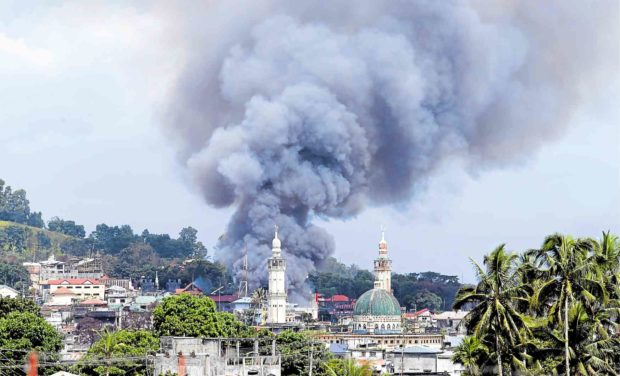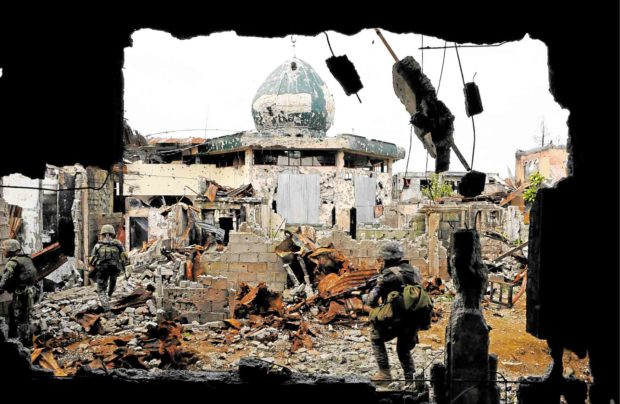Covering Marawi

A CITY BURNS Black smoke billows from downtownMarawi in June 2017, after a military airstrike meant to flush out Islamic State-inspired terrorists holed up in the city.
KORONADAL CITY—I was home on May 23, 2017, when the Marawi story broke out. I initially thought that state security forces would be able to resolve the standoff between the military and the Islamic State-linked Maute group within a few hours. I was wrong.
Instead, the situation escalated, and I had to convince my wife that I needed to travel straightaway.
I drove to Cotabato City and joined another freelance photographer. Though it took us almost four hours to get to Iligan in Lanao del Norte province because of the heavy traffic and tight security, the city appeared normal when we stayed there overnight.
But we found the road to Marawi clogged with thousands of residents carrying just a few belongings, confident that they could come back posthaste when things settled down a bit. “We had no choice [but leave],” one of them said. “The military and police want us out or they’d consider us supporters of Maute.”
Long billows of smoke greeted our approach to Marawi. At a military camp, hundreds of troops were preparing for their deployment to the business capital district where their mission was to flush out the Maute militants.
Article continues after this advertisementAmid loud bursts of gunfire, reporters and photographers tailed the soldiers as they marched toward the city. The sound of gunfire was frightening and so was the sight of Sarimanok village which became a ghost town soon after the fighting erupted.
Article continues after this advertisementAs members of the press took cover in one of the tall buildings in Sarimanok, an object landed close to where we were. Thinking it was a hand grenade, we quickly dove flat on the ground while others scampered for safety. Luckily, no one was hit.
Things deteriorated further, with militant snipers taking aim at soldiers and media inside the Army facility. The militants were later neutralized.
But as the fighting dragged on for weeks and months, getting information from the inside became more difficult. Restrictions were imposed on media and soon, the only way to get any information was to stay put at the provincial capitol of Lanao del Sur. Desk editor Allan Nawal and fellow correspondents Richel Umel and Divina Suson later joined the Inquirer team.
To see action firsthand, media folk occupied a private home high enough for us to scope the battle area. From our location, we could observe the aerial bombing, houses burning and the nonstop exchange of firepower between both sides.
Despite a distance of some 2 kilometers between the capitol and the battlefield, stray bullets managed to find one of us, a foreign journalist.
To cover the fighting at night, Umel, myself and another photographer spent a night with the Marines stationed at an abandoned hospital near Mapandi Bridge. Military snipers told us it pained them to pull the trigger as they could see from their weapons telescope that their enemies were young fighters. More than a thousand people died in the five months of fighting in Marawi, with the casualties being “mostly militants,” according to the military.
Horrors of destruction
The next day, soldiers took us to the frontline where for the first time, we saw up close the horrors of destruction from the fighting. It was depressing. A mother at the evacuation center lost four of her children in the panic and chaos of battle. She was still looking for them.
Another woman lost ten of her relatives during the five-month conflict. She had accepted their fate, she said, adding that they had been recruited by the Maute group.

THIS USED TO BE AHOME Remnants of civilian life are all that remain in this house used as a hideout by Maute terrorists in Marawi City.
The gymnasium turned evacuation center in Saguiaran, Lanao del Sur, was packed with displaced civilians who only had distressing stories to share: a father who saw his son executed by government troops for his alleged links with militants, family members torn off from loved ones at the height of the fighting.
But there were a few inspiring stories as well.
Jessie James Vente was distressed when he learned about the destruction of the city where he lived for six years. Bringing his wares as a barber, he visited the evacuation camps once a week to offer free haircuts to those displaced by the fighting.
“I stayed for two years in Bangolo village,” Vente said of one of four villages still under the control of Maute and Abu Sayyaf gunmen when he visited the camps.
“I was [working for] a construction firm. The slaughter house and the banks were very near the place where I was staying. But now, every time I see television reports about Marawi and its ruins, my heart bleeds,” he added.
Vene said the free hair cut was payback for the good deeds of the people he had met while living in Marawi. “We’re all going to die,” he said. “But good deeds last.”
